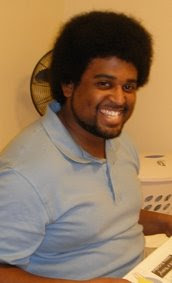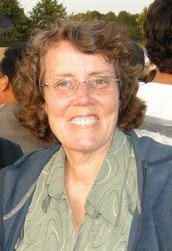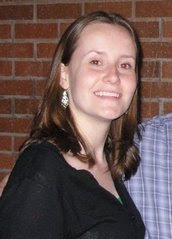Here is a copy of a news item that includes Andrea! Way to go, Andrea! Besides your great success at weight loss right now, you are also making us proud in your chosen field! Great job!! (USC is University of Southern California)
The Importance of Doing the Math
10/15/08
With the national shortage of math teachers, a new fellowship program offers graduates incentives to remain in the classroom, including graduate education and a five-year stipend.

Andrea Hodgson, a Math for America fellow, works with a student.
Photo/Stephanie Erickson
Photo/Stephanie Erickson
But the pool of highly qualified math teaching talent has been shrinking, and there are incentives for math-savvy instructors to pursue fields other than teaching.
Math for America Los Angeles launched this year to address the shortage of high-quality mathematics teachers by attracting top math majors to greater Los Angeles area classrooms – and keeping them there.
The program, which is primarily funded by the Simons Foundation, recently held an informational luncheon in Los Angeles hosted by philanthropist Eli Broad. The USC Rossier School of Education is a member of the Math for America partnership along with Harvey Mudd College and the Claremont Graduate School.
Math for America originated as a pilot for New York City schools and is the vision of mathematician, businessman and philanthropist James H. Simons.
While Los Angeles is one of the most expensive cities to live in the United States, the starting salary in the Los Angeles Unified School District for a credentialed teacher with a master’s degree is about $46,600.
In contrast, the starting salary in other mathematics-related fields for recent master’s degree recipients was on average between $60,000 and $70,000.
Math for America aims to curtail the trend of fleeing math teachers by offering its fellows an annual stipend of $20,000 for five years, in addition to paid tuition and teacher salaries.
In the first year, students pursue a master’s degree and teaching credential from USC or Claremont Graduate University.
Mariam Youssef, one of Math for America’s 11 inaugural fellows, said tuition to attend the USC Rossier School of Education was more of a selling point than the stipend.
“I think I would’ve still taught and been OK with the (teacher) salary being less, but the issue for me was paying for grad school,” Youssef said. “I wanted to go to a good program, but they’re expensive.”
During the subsequent four years, fellows teach in the greater Los Angeles area and receive the annual stipend in addition to their teacher salary, reducing the urge to drop teaching for a better salary elsewhere.
Stephanie Erickson, another Math for America fellow, said she earned her bachelor’s in math and applied to USC with the goal of teaching in Los Angeles when site director Pam Mason told her about the new program.
“I got a phone call that felt a little like Christmas,” Erickson said. “I was going to put myself $80,000 in debt to do this, and they were going to pay me to do it.”
Each fellow is assigned a master teacher, who mentors him or her during the process and provides the support and encouragement many teachers never receive during their challenging first years.
Professional development opportunities are provided through Harvey Mudd College. By the end of the five-year fellowship, every Math for America fellow is expected to strive for national certification – the highest achievement for an educator and one that generates larger pay raises.
With new sites opening in Los Angeles and San Diego this year and another due to open in Washington, D.C., in the near future, efforts to expand Math for America nationally are under way.
Lee Umphrey, interim executive director of Math for America, said John Ewing recently was appointed the first president for the national office.
Future sites may take longer to come to fruition due to the financial climate.
“Many cities and states are interested in starting MFA sites, and everyone agrees there’s a definite need,” Umphrey said. “Federal funding is tenuous for the next couple of years because of budgets in Washington. And given the recent financial situation, private funding will be scarcer, making it more challenging for new sites to start up.”
Andrea Hodgson, another of the first crop of Math for America fellows in Los Angeles, said her experience in the classroom has been positive thus far, and she sees the program making a real difference in math education for the area.
“I’m learning so much, and I can really just focus on learning how to teach and being a good teacher,” Hodgson said of the fellowship program. “(Math for America) has the potential to change the area with the talent, drive and education from USC. It’s helping the math curriculum (in local schools) get stronger.”









 No Personal Blog
No Personal Blog 






